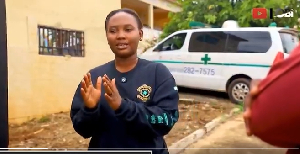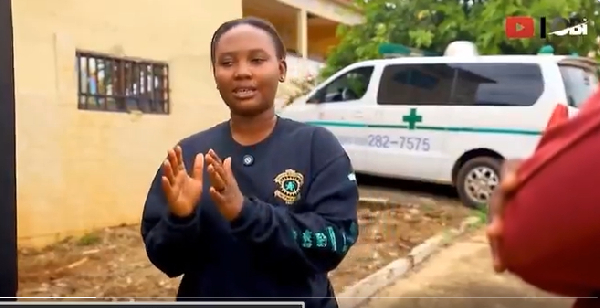 Growing up at Agona Swedru in the Central Region, Winifred was no stranger to the funeral business
Growing up at Agona Swedru in the Central Region, Winifred was no stranger to the funeral business
At just 24 years old, Winifred Ewurabena Quartey is reshaping perceptions in Ghana’s funeral services industry by becoming one of the country’s youngest female morticians and hearse drivers.
Growing up at Agona Swedru in the Central Region, Winifred was no stranger to the funeral business.
Her father ran Jabe’s Dominique Funeral Home, a household name in the community for over 25 years.
When her father’s health declined, the family business was forced to temporarily close its doors.
While many of her peers chose traditional career paths in fields such as medicine, law, or education, Winifred made the decision to take over the funeral home and revive her father’s legacy.
“This business is my calling. I do it with passion, and unlike my siblings, I am not afraid. I realised I could make a difference here, offering the care and support grieving families need, rather than working elsewhere for a salary,” she said in an interview with Obibini TV Studio on YouTube on June 30, 2025.
Her role extends beyond that of a typical mortician.
She is also a certified hearse driver, managing every aspect of the funeral process from embalming and body preservation to coordinating wakes and burials.
Winifred operates two branches of the family business: one at Agona Swedru and another at Gomoa Oguoa.
The services offered by Jabe’s Dominique Funeral Home include cold storage, embalming, the sale of caskets, wreaths, funeral accessories, and hearse rentals.
Winifred is actively involved in each area, working with care and respect for both the deceased and their families.
“I have heard the rumours. Some say we use ‘juju’ or perform strange rituals, but for me, my only spiritual backing is God. We don’t pour libation or allow any questionable practices. Everything we do is professional and strictly governed. I see the dead bodies as being asleep and I was trained up that when a man sleeps, we don’t wake him up. So, I see them as asleep.”
“We don’t allow anyone to take water used for bathing the body or any part of the deceased. Every process is transparent and respectful,” she added.
A typical day for her involves hands-on tasks such as preparing bodies for preservation, embalming, organising funeral logistics, and comforting bereaved families.
“We clean the body, ensure there’s no fluid retention, and use dry embalming methods. Every step is carried out with professionalism and respect for cultural traditions,” she added.
Watch her video below:
AM/AE
GhanaWeb Special: The gold market that fuels galamsey


